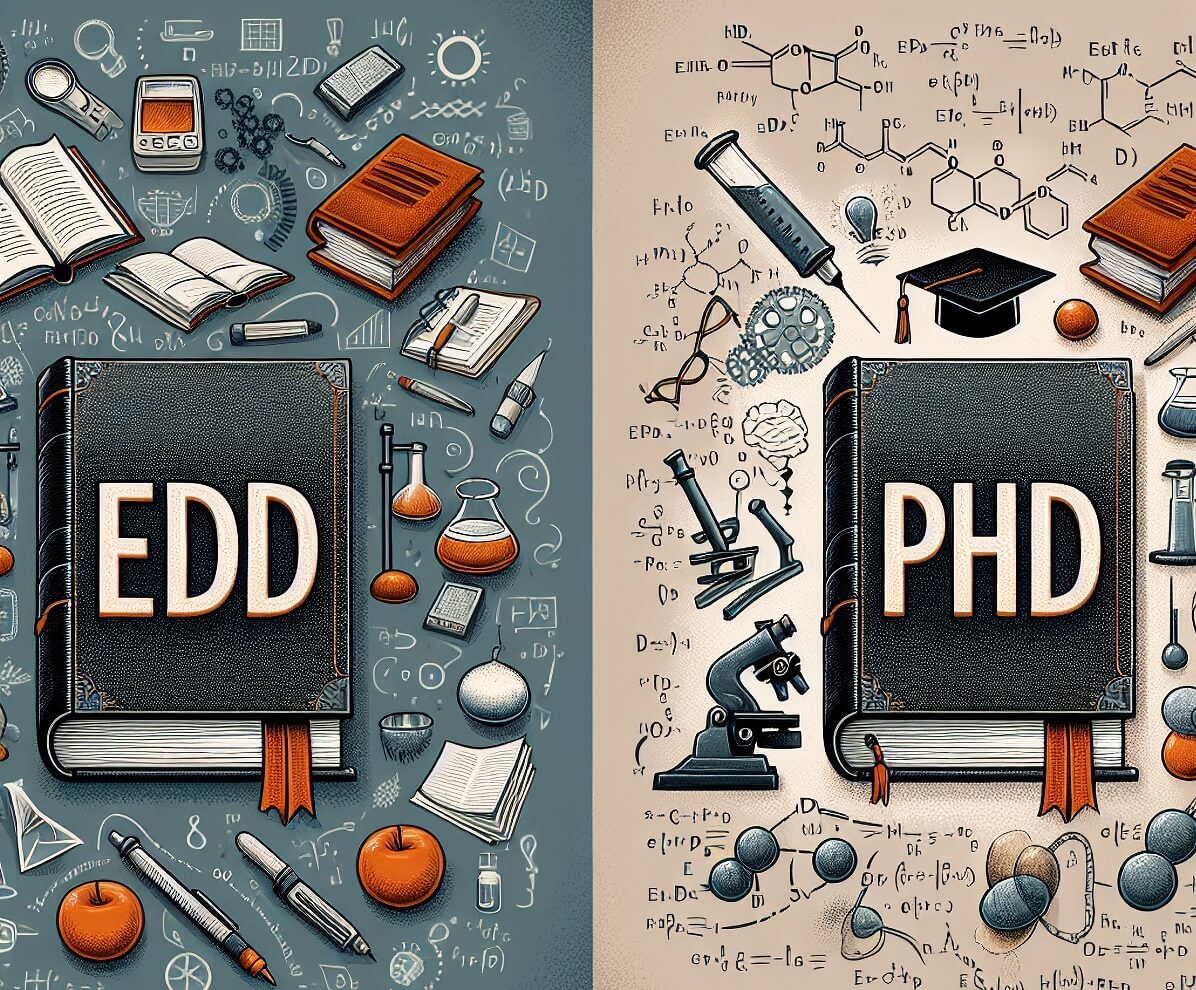
What is the Difference Between an EdD and a PhD?
Good leaders have the power to improve the world around them and inspire widespread positive change. For some, leadership is more than a skillset; it's a calling inspired by a passion for lifelong learning and living well.
Current and aspiring leaders in education, government, and healthcare often look for ways to grow in their careers while shaping the broader future of their industry. For many leaders, pursuing a doctoral degree is the best next step.
Understanding Doctoral Degrees in Education
A doctoral degree is the highest student achievement in their discipline. Students can become acclaimed experts in their chosen area of study through rigorous coursework, meticulous research, and completing a dissertation paper or project.
Earning a doctoral degree is a multi-year intensive effort. Still, the reward is well worth it for candidates passionate about leading their field into a brighter tomorrow. Master's degree holders ready to step into a doctoral program may ask: what is the difference between a doctor of education and a Ph.D.?
There are two types of doctoral degrees in education: a Doctor of Education (Ed.D.) and a Doctor of Philosophy (Ph.D.). These degree programs share a few common themes, but their intended goals and assigned coursework differ. Aspiring doctoral candidates should understand these differences to select the best path forward for their personal and professional goals.
What is a Doctor of Philosophy (Ph.D.) in Education?
A Doctor of Philosophy is a terminal degree with a theoretical and research-based focus. Students work to find research gaps, analyze existing data, and introduce their original research to advance academia.
Individuals who pursue Ph.D. degrees often go on to become higher education faculty members or academic researchers. Common Ph.D. in Education careers include:
- Academic Researcher — Academic researchers study existing research to solve problems and create better outcomes. They also conduct experiments and publish the findings of their research.
- University Professor – Professors at colleges and universities are highly qualified teachers who use their specialized research and expertise to educate students. They frequently publish their own work and participate in ongoing research in their chosen field of study.
- Educational Policy Analyst—Individuals in this line of work review current educational policies and study their effects on students, administrators, and education systems. They also monitor current trends in education and draft or amend education-related legislation.
- Curriculum Developer — Curriculum developers use their research abilities to craft a curriculum that delivers key learning objectives and helps students meet learning benchmarks.
- Educational Consultant — Instead of being employed by a specific institution, consultants partner with various schools and administrators to provide valuable insight and feedback about educational systems. Their work centers around improving outcomes for both learning institutions and the students who attend them.
What is a Doctor of Education (Ed.D.)?
Like its Ph.D. counterpart, the Ed.D. is a terminal degree, which means it is the highest level of academic achievement in a field of study. A Doctor of Education is designed to help individuals become leaders in the field of education.
While a Ph.D. focuses on conducting research, an Ed.D. focuses on putting research into practice in practical ways. Becoming a Doctor of Education allows you to put your expertise to work in a wide variety of real-world applications. Ph.D. earners typically go on to work in academia, but Ed.D. holders find success in education and other industries alike.
Ed.D. graduates are qualified to, including:
- College or University President — Postsecondary school presidents are the top leaders of their institution. They are visionaries who participate in many aspects of a school, from fundraising to marketing and budgeting to curriculum oversight. In 2023, the median salary for postsecondary administrators averaged $102,610, and presidents typically earn higher wages than the median figures.
- Instructional Coordinator—Instructional coordinators study data from schools and colleges and use their findings to implement new curricula and improve teaching standards. Rather than working at one institution, they use their skills to serve multiple schools and improve learning outcomes. In 2023, instructional coordinators were paid an average annual salary of $74,620.
- School Superintendent — A superintendent is the top official in a school district, working with administrators and teachers to oversee administration and academic performance. In 2023, superintendents averaged an annual salary of $103,460.
- Academic Dean—Academic deans are the leaders of specific departments at postsecondary institutions. This role allows Ed.D. holders to pursue a career in a specialized area. They can become deans of an academic department, deans of admissions, deans of faculty, or deans of student affairs, to name a few. As postsecondary administrators, deans received a median salary of $102,610 in 2023.
- Chief Learning Officer (CLO): CLOs can be found in school systems, large corporations, and nonprofit organizations. They are adept at research, administration, and strategy and oversee education and development for the entire organization. As top executives, CLOs averaged an annual salary of $103,840 in 2023.
3 Key Differences Between Ed.D. and Ph.D. Degrees
Focus and Purpose
Ph.D. and Ed.D. degree programs both equip students with the skills required to become tomorrow's leaders in education. However, Ph.D. degrees prepare graduates for research-based roles, while Ed.D. degrees pave the way for graduates to become practitioners in many fields. For aspiring leaders who want to apply their knowledge as real-world leaders in education, healthcare, business, and government, an Ed.D. provides the necessary tools and training.
Length and Commitment
Ph.D. programs typically take five or more years to complete and average 90 credit hours of coursework, while Ed.D. programs usually take three years to complete and average 60 credit hours of coursework. Ph.D. programs typically require full-time study, while some Ed.D. programs are part-time, which allows career-focused individuals to continue their education without stepping away from the workforce. Practitioners who have taken steps toward career advancement may want to earn their Ed.D. while working to continue their education and job growth potential.
Degree Requirements
A dissertation is a critical component of any doctoral degree. However, Ph.D. dissertations are research-based and focused on theory. At the same time, some Ed.D. programs prefer to assess students through practice-based or problem-based dissertations. This type of dissertation focuses on practical applications of a student's research rather than the research itself, giving them experience in solving the kinds of educational problems they may face in their careers.
Why Choose an Ed.D. Degree?
Aspiring leaders who love to solve problems, apply research, and become respected educators in their field should consider earning their Ed.D. Degree holders are equipped to become leaders in education and influential public and private sector roles.
After earning a Doctor of Education degree, graduates will be prepared to make a meaningful impact in their chosen field. They can advocate for policy change, improve educational systems and student learning outcomes, solve complex problems, and inspire far-reaching and long-lasting positive change.
Students must choose the right degree based on their career goals and preferred course of study. If a research-based Ph.D. program is not aligned with their career trajectory, an Ed.D. provides an equally valuable terminal degree with skills that can be easily applied to real-world roles.
Earn Your Ed.D. at St. Bonaventure University
St. Bonaventure University's online Ed.D. in Educational Leadership was built to acknowledge the complex realities of today's learning and leadership environments. Doctor of Education Students at SBU will experience online coursework that is rigorous but purposeful, designed to help them in their current jobs and propel them into a leadership role as their careers continue to grow.
As the nation's first Catholic-Franciscan university, St. Bonaventure is committed to training students in compassion, humanity, ethics, and integrity. These values equip every student to become a leader in both intellect and integrity.
With 100% online coursework, this doctorate in educational leadership is achievable alongside existing commitments. Many Ed.D. students are working professionals, and at SBU, highly individualized study options and personally chosen committee groups allow doctoral students to thrive.
The Ed.D. program at SBU features coursework about educational leadership, combining research and theory with real-world application for a comprehensive education. Students will take courses such as:
- Applied Research in Educational Leadership
- Leadership Theories and Practices
- Complexity, Communication, and Collaboration
- Analyzing Diversity Policy & Practices in Education
The program culminates in a problem-based dissertation. Students can choose from three dissertation options based on their areas of interest and career objectives. The dissertation process equips students to apply research to real-world problems and provide practical solutions.

